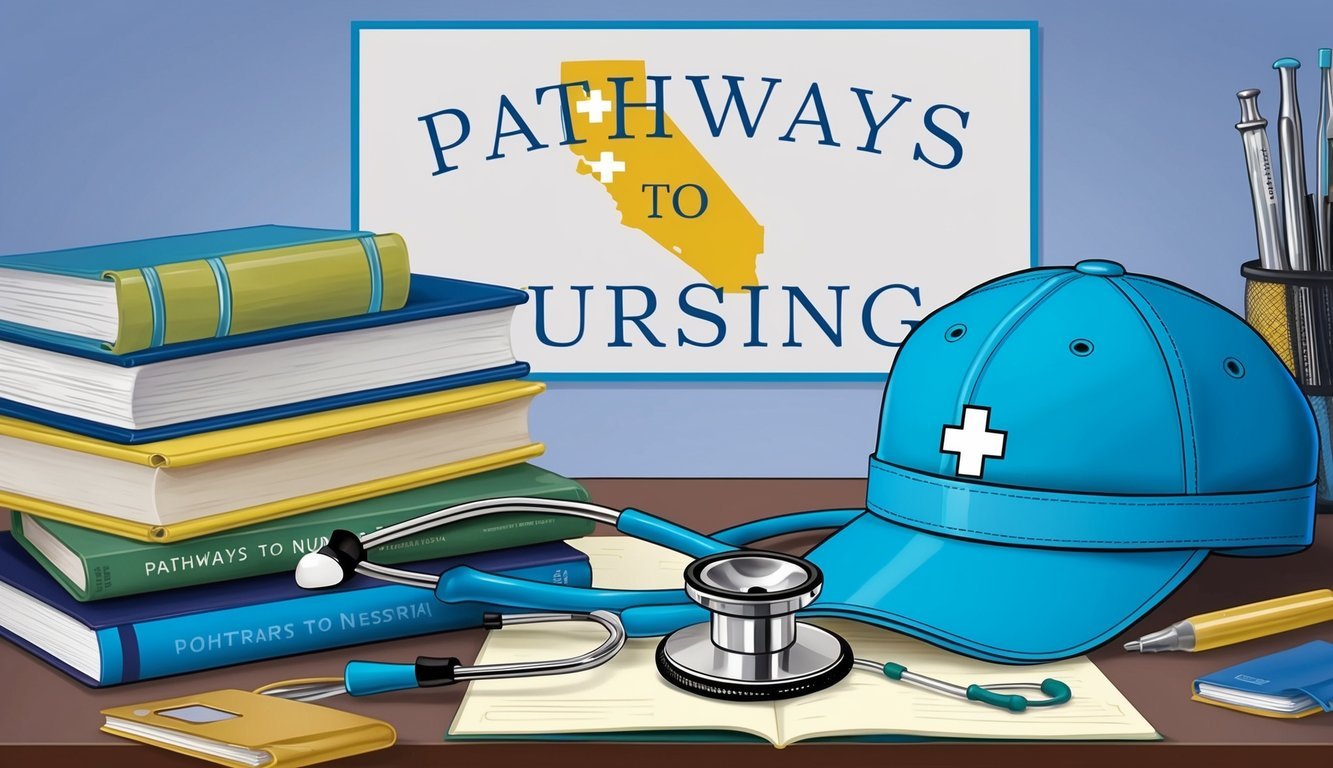Navigating the landscape of nursing education in Nevada can be thrilling yet challenging.
You may wonder which programs offer the best opportunities for your nursing career.
The state boasts several reputable nursing schools that provide Bachelor of Science in Nursing (BSN) degrees and other nursing programs tailored to meet diverse career goals.
Whether you are pursuing an associate degree or aiming for a higher-level BSN, Nevada’s nursing schools utilize comprehensive curricula to prepare you for entry-level positions and beyond.
Institutions such as the University of Nevada, Reno and the University of Nevada, Las Vegas focus on equipping students with the essential skills needed in various healthcare settings.
Exploring your options will help you make an informed decision about your education.
With competitive admission requirements and a strong emphasis on practical experience, the nursing programs in Nevada are designed to cultivate future healthcare leaders.
Selecting the right nursing school is crucial to ensure your success in the ever-evolving field of nursing.
Overview of Nursing Schools in Nevada
Nursing schools in Nevada offer a variety of programs and degrees that meet the state’s growing demand for healthcare professionals.
Understanding the accreditation standards, degrees available, and tuition differences can help you choose the right path for your nursing career.
Accreditation Standards
Accreditation is critical for ensuring that nursing schools meet established educational standards.
In Nevada, many programs are accredited by organizations like the Accreditation Commission for Education in Nursing (ACEN) or the Commission on Collegiate Nursing Education (CCNE).
Being accredited not only enhances the quality of education but also impacts program eligibility for federal financial aid and licensure.
You should always confirm that your chosen program is accredited, as this can affect your ability to sit for the NCLEX exam and gain employment after graduation.
Degrees Offered
Nursing programs in Nevada provide various degree options to accommodate different career goals.
Common degrees include:
- Associate Degree in Nursing (ADN): Typically takes 2-3 years and prepares you for entry-level positions.
- Bachelor of Science in Nursing (BSN): A 4-year degree that opens doors to advanced roles and specialties.
Some schools also offer RN-to-BSN programs for registered nurses seeking to further their education.
You can explore the specific programs available at institutions like the University of Nevada, Reno or the College of Southern Nevada.
In-State vs Out-of-State Tuition
Tuition rates can vary significantly depending on whether you are a Nevada resident or an out-of-state student.
Generally, in-state tuition rates are much lower.
For example, public institutions often charge significantly reduced fees for residents, making healthcare education more accessible.
Here’s a general comparison of tuition rates:
| Type of Student | Average Annual Tuition |
|---|---|
| In-State | $8,000 – $10,000 |
| Out-of-State | $25,000 – $35,000 |
Knowing these costs can help you budget accordingly and make informed financial decisions about your education in nursing.
Always check with the specific institution for the most accurate and up-to-date tuition information.
Pathways to Nursing

Pursuing a nursing career in Nevada involves several educational pathways, each designed to meet the diverse needs of aspiring nurses.
You can choose from Associate Degree in Nursing (ADN) programs, Bachelor of Science in Nursing (BSN) programs, RN to BSN tracks, and opportunities for advanced practice nursing.
ADN Programs
ADN programs provide a quick entry point into nursing.
Typically taking two to three years, these programs focus on essential nursing skills and knowledge.
You will engage in both classroom instruction and hands-on clinical experiences to prepare for the NCLEX-RN examination.
Several institutions in Nevada offer ADN programs.
For instance, the College of Southern Nevada provides a 69-credit associate degree with both part-time and full-time options.
Graduating from an ADN program allows you to seek immediate employment as a registered nurse in various healthcare settings, such as hospitals and clinics.
BSN Programs
A BSN program is essential for those seeking to broaden their career prospects.
This four-year program covers advanced nursing practices, leadership, and healthcare management.
You will delve into subjects like community health and nursing research, which equip you for more complex roles in the healthcare system.
The University of Nevada, Reno offers a well-regarded BSN pathway.
Graduates enjoy eligibility for entry-level nursing positions and have opportunities for further advancement in their careers, including graduate studies.
A BSN degree is also favored by many employers, making it a valuable asset in today’s job market.
RN to BSN Programs
If you already hold an ADN, an RN to BSN program allows you to further your education while maintaining your job.
This program typically takes one to two years and focuses on building on your prior knowledge and skills.
Courses may include nursing leadership, ethics, and advanced clinical practices.
Many institutions in Nevada offer RN to BSN tracks, often available in a flexible format, allowing you to complete coursework online or part-time.
This pathway enhances your qualifications and potentially increases your earning potential.
It also positions you for roles that require a higher level of education and expertise.
Advanced Practice Nursing
For those considering advanced practice roles, pursuing a Master of Science in Nursing (MSN) or a Doctor of Nursing Practice (DNP) is essential.
MSN programs allow you to specialize in areas such as nurse practitioner, clinical nurse leader, or nursing administration.
A DNP focuses on clinical practice and leadership, preparing you for the highest levels of nursing practice.
These advanced pathways typically require a BSN for admission and involve rigorous coursework coupled with practical experience.
Programs often incorporate evidence-based practice, healthcare policy, and advanced clinical skills, ensuring you are equipped to lead in the evolving healthcare landscape.
Consider exploring the detailed offerings at schools such as Touro University Nevada, which provide a variety of advanced nursing programs suited to your career goals.
Top Nursing Schools and Programs in Nevada
Nevada offers several esteemed nursing programs that prepare students for a successful career in healthcare.
Each institution provides unique pathways and specializations to help you achieve your nursing goals.
University of Nevada – Reno
The University of Nevada, Reno offers an accredited Bachelor of Science in Nursing (BSN) program through the Orvis School of Nursing.
This program is known for its comprehensive curriculum that combines classroom instruction with hands-on clinical experiences.
- Admission: The program admits 64 students each fall and spring, ensuring a focused learning environment.
- NCLEX Pass Rate: Graduates typically achieve a high passing rate on the NCLEX, which is essential for licensure.
Additionally, the university supports students with various resources, including mentorship and academic advising.
You can learn more about their nursing programs by visiting University of Nevada – Reno.
Nevada State College
Nevada State College specializes in providing a robust nursing education with its Bachelor of Science in Nursing program.
This program emphasizes critical thinking and evidence-based practices in nursing.
- Clinical Experience: Students gain valuable clinical exposure in a variety of healthcare settings.
- Flexible Learning: Offers full-time and part-time study options to accommodate different schedules.
The college’s commitment to developing compassionate and skilled nurses makes it a popular choice among prospective students.
For more details, check out Nevada State College.
Orvis School of Nursing
Located within the University of Nevada, Reno, the Orvis School of Nursing is distinguished for its innovative approaches to nursing education.
It offers both undergraduate and graduate programs.
- Graduate Programs: Includes Master’s and Doctorate options for advanced practice nursing.
- Research Opportunities: The school encourages participation in research projects that address key health issues in Nevada.
You can explore their offerings further at the Orvis School of Nursing.
Other notable institutions in the state include Truckee Meadows Community College and Roseman University of Health Sciences, both contributing to Nevada’s growing demand for well-trained nurses.
Licensure and Certification
Obtaining the necessary licensure and certification is essential for your nursing career in Nevada.
Understanding the NCLEX-RN exam requirements and the Enhanced Nursing Licensure Compact (ENLC) will help you navigate the initial steps toward becoming a registered nurse (RN).
NCLEX-RN Exam
To practice as a registered nurse in Nevada, you must pass the NCLEX-RN exam.
This exam assesses your competency in various areas of nursing practice.
The pass rate for Nevada nurses varies each year, but recent statistics indicate a consistent performance among candidates.
Here are the key components of the NCLEX-RN exam process:
- Eligibility: You must meet educational requirements from an accredited nursing program.
- Application: Apply through the Nevada State Board of Nursing for eligibility.
- Studying: Utilize review courses and practice tests to prepare effectively.
- Scheduling: Register for the exam via Pearson VUE to select a testing date and site.
For detailed information about resources and preparation, visit the Nevada State Board of Nursing.
Enhanced Nursing Licensure Compact
The Enhanced Nursing Licensure Compact (ENLC) allows registered nurses to practice in multiple states without needing additional licenses.
This compact benefits you by expanding your job opportunities while maintaining your Nevada nursing license.
Key features of the ENLC include:
- Interstate Practice: You can practice in any participating compact state.
- Streamlined Process: The application for an ENLC license is simplified and quicker than obtaining separate licenses.
- Permanent Residency: To obtain an ENLC license, you must declare Nevada as your primary state of residence.
Participating in the ENLC can enhance your mobility and job prospects significantly.
For more details on compact legislation, refer to the NCSBN website.
Career Opportunities and Advancement

Nursing offers a range of career opportunities that allow for both specialization and advancement.
As you progress in your nursing career, you can explore various roles that cater to your interests and strengths.
Clinical Positions
In clinical settings, you can expect to engage in direct patient care, which is the foundation of nursing.
Common roles include Registered Nurse (RN), Nurse Assistant, and specialized positions such as Mental Health Nursing.
| Position | Responsibilities |
|---|---|
| Registered Nurse (RN) | Provides patient care, administers medications, collaborates with healthcare teams. |
| Nurse Assistant | Supports RNs with basic patient care and daily activities. |
| Mental Health Nurse | Focuses on mental health diagnoses and treatment plans. |
Each role plays a vital part in promoting patient health and recovery.
As you gain experience, you may take on more complex cases or move into specialized areas.
Leadership Roles
Advancing into leadership positions such as Nurse Executive or Clinical Nurse Leader opens new pathways.
These roles involve overseeing nursing staff, managing operations, and enhancing patient care quality.
| Position | Key Functions |
|---|---|
| Nurse Executive | Develops policies, manages budgets, leads nursing teams. |
| Clinical Nurse Leader | Coordinates patient care across teams, mentors staff, implements best practices. |
Leadership roles require strong communication and organizational skills.
Continued education, like a Master’s degree, can be beneficial for these paths.
Specialized Fields
Nursing also allows for exploration in specialized fields which can enhance your career prospects.
Areas like pediatric nursing, geriatric nursing, and mental health nursing are in high demand.
| Specialized Field | Focus Area |
|---|---|
| Pediatric Nursing | Care for infants, children, and adolescents. |
| Geriatric Nursing | Specializes in care for the elderly. |
| Mental Health Nursing | Provides support for patients with psychological disorders. |
By selecting a specialty, you can differentiate yourself and improve your job prospects in a competitive market.
Continuous education and certification in these fields can enhance your expertise and open additional opportunities.
Resources and Support for Students

Nursing schools in Nevada offer various resources and support systems to enhance your educational experience.
This section highlights financial aid opportunities, academic advising, and program outcomes that contribute to your success.
Financial Aid Opportunities
Many nursing programs in Nevada provide a range of financial aid options to support your education.
You can access federal and state grants, scholarships, and loans tailored specifically for nursing students.
Institutions like the University of Nevada, Las Vegas offer scholarships based on merit and financial need.
Additionally, the College of Southern Nevada provides guidance for students seeking financial support.
Consider applying for the Nevada Nursing Scholarship Program, which can greatly reduce tuition costs.
| Financial Aid Type | Description |
|---|---|
| Grants | Financial aid that doesn’t require repayment |
| Scholarships | Awards based on merit or need |
| Federal Student Loans | Loans with low-interest rates for educational expenses |
Academic Advising and Support Services
Nursing schools in Nevada also provide academic advising and support services.
Effective academic advising is essential for your success in nursing school.
Advising services include personalized guidance on course selection, degree planning, and career pathways.
Faculty members with clinical experience often serve as advisors, offering invaluable insights.
Most nursing schools in Nevada, such as Nevada State University, provide dedicated support services.
These may include tutoring, study groups, and online resources for research and skill development.
Utilizing these services can help you navigate your program more effectively.
Program Outcomes and Success Rates
Understanding program outcomes and success rates is vital when choosing a nursing school.
These metrics often indicate the quality of the education you will receive.
For instance, BSN students in Nevada have NCLEX pass rates ranging between 76.27% and 92.95%.
Meanwhile, ADN students report rates between 83.10% and 96.20%.
You can find specific data for various institutions through state nursing boards or the school’s website.
Assessing these outcomes can help you select a program that aligns with your career goals and aspirations.
| Program Type | NCLEX Pass Rate Range |
|---|---|
| BSN | 76.27% – 92.95% |
| ADN | 83.10% – 96.20% |

